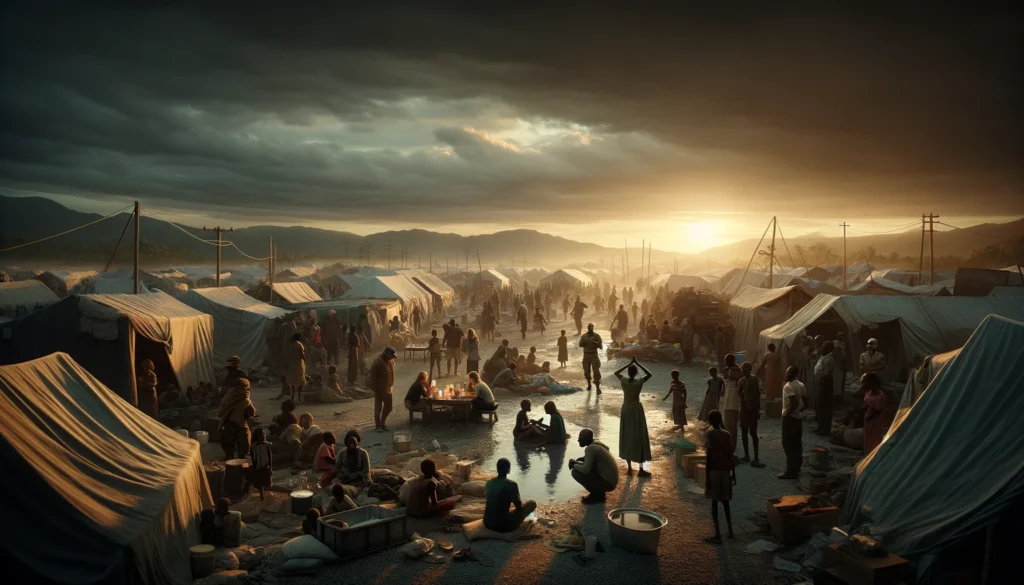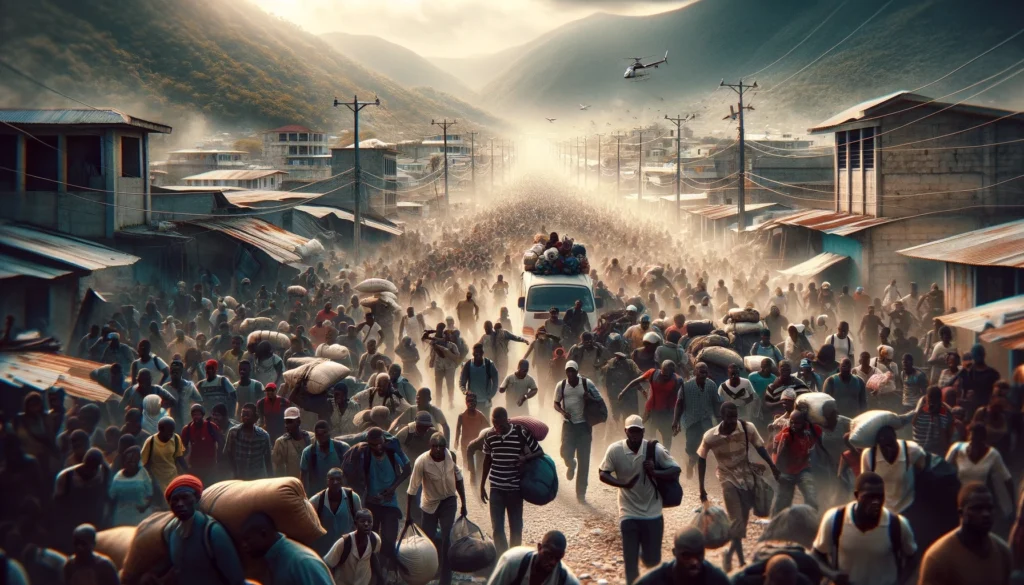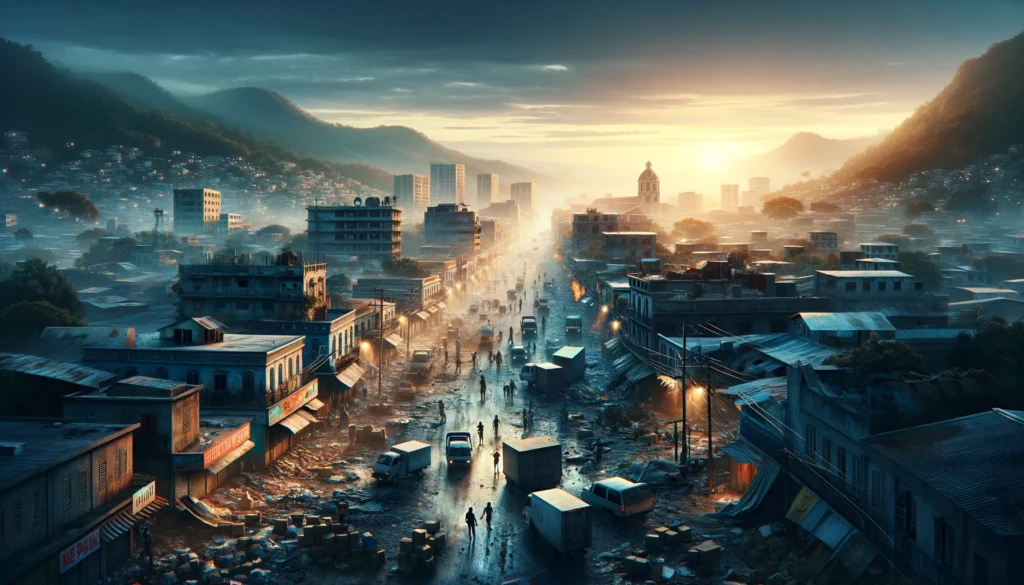
By Darius Spearman (africanelements)
Support African Elements at patreon.com/africanelements and hear recent news in a single playlist. Additionally, you can gain early access to ad-free video content.
| Key Takeaways | Details |
|---|---|
| Unprecedented Human Rights Crisis | Haiti is experiencing a severe increase in violence, leading to unprecedented human rights abuses such as killings, kidnappings, and widespread sexual violence. |
| Political Instability Intensifies Crisis | The resignation of Prime Minister Ariel Henry and the establishment of a transitional council have deepened Haiti’s political instability. |
| Dire Humanitarian Situation | Over 360,000 individuals are displaced, facing heightened risks of sexual violence and a lack of basic necessities. |
| Women and Girls Suffer Most | The crisis disproportionately affects women and girls, with sexual violence being used as a weapon by gangs, exacerbating their suffering. |
Haiti’s Human Rights Nightmare
Haiti is embroiled in a catastrophic crisis, with violence reaching alarming levels. U.N. Rights Chief Volker Türk sheds light on the dire situation, stressing the urgent need for action.
“There has been a shocking rise in killings and kidnappings. Sexual violence, particularly targeting women and young girls, is pervasive and very likely to have reached levels not seen before.”
Moreover, the crisis doesn’t stop here. Over 360,000 people now find themselves internally displaced, according to the International Organization for Migration (IOM). This displacement exposes them to further violence.

Gang violence is a key driver of this crisis, with groups fighting for control over Port-au-Prince and other areas. Innocent civilians are caught in the crossfire, facing threats of death and the trauma of sexual violence.
The humanitarian impact is profound. Families flee their homes in search of safety, leaving behind everything they know. The fear and desperation that drive over 50,000 people to abandon their lives in just three weeks, as reported by the IOM, paint a picture of the acute crisis at hand.
“Due to gang violence, 53,125 people left the city between March 8 and March 27,”
They leave behind memories, belongings, and a piece of their hearts in the process.
Escalating Violence and Rights Violations in Haiti
Haiti’s human rights situation has reached a crisis point. The nation now faces an alarming increase in violence. U.N. Rights Chief Volker Türk sounded the alarm on this urgent issue. He emphasized the severity of the situation with grave concern.
“There has been a shocking rise in killings and kidnappings. Sexual violence, particularly targeting women and young girls, is pervasive and very likely to have reached levels not seen before. As the number of people internally displaced rises — over 360,000 now, according to IOM — so, too, does a further risk of sexual violence, as people find themselves away from their homes and their communities.”
Moreover, the impact of this violence stretches far beyond physical harm. Communities are living in constant fear. Daily life in Haiti has become a struggle for survival. Reports from the ground paint a harrowing picture of the daily realities faced by Haitians. Children can no longer play outside safely. Schools struggle to remain open. Moreover, families are often torn apart as they flee their homes in search of safety.
Haiti’s Political Turmoil Intensifies
Haiti’s political landscape is crumbling under the weight of its crisis. The resignation of Prime Minister Ariel Henry has thrown the country into deeper chaos. Furthermore, the contentious formation of a transitional council adds layers of complexity to an already intricate political crisis.
Henry’s unexpected exit left a power vacuum. He could not return due to pressure from armed groups. This situation highlights the volatile mix of politics and violence plaguing Haiti. Consequently, questions about governance and constitutional legitimacy loom large.
“Recently resigned Prime Minister Ariel Henry, who remains locked out of Haiti by armed groups, raised questions this week over the constitutionality of a transitional council.”
Moreover, the international community watches closely as Haiti attempts to navigate these troubled waters. The formation of a transitional council was supposed to be a step towards stability. Yet, it seems to have only muddled the political scenario further.
Additionally, the council’s decision-making process faces scrutiny. Transparency and inclusivity are under question. Hence, the legitimacy of any actions taken by this council is a significant concern for Haitians and international observers alike.
Lastly, this political vacuum does not just hamper effective governance. It leaves the nation susceptible to further violence and turmoil. As a result, the need for a legitimate, effective governance structure is more urgent than ever. Without it, Haiti’s path to recovery remains uncertain.
Haiti’s Escalating Humanitarian Emergency
The humanitarian situation in Haiti underlines the urgent need for a global response to provide relief and support to those affected.

Firstly, the rapid surge in violence within Port-au-Prince has resulted in an unprecedented displacement crisis. Moreover, the displaced populations face daunting challenges in their search for safety. Away from their homes and communities, they are more vulnerable to exploitation and violence.
In makeshift camps, where many find temporary shelter, conditions are dire. Access to essential services like clean water, sanitation, and healthcare is severely limited, exacerbating the risk of disease outbreaks. Furthermore, the specter of sexual violence looms large, adding a layer of fear and trauma for those already burdened by displacement.
Finally, the international community’s role is crucial in addressing this humanitarian emergency. There is a pressing need for aid organizations and governments worldwide to step up their efforts. Providing immediate relief in the form of food, water, shelter, and medical care is critical. However, it is equally important to focus on long-term solutions that address the root causes of the crisis and help rebuild the affected communities.
Haiti’s Crisis Magnifies Violence Against Women and Girls
The crisis in Haiti has brutally impacted women and girls, exposing them to horrific levels of violence. Gangs, vying for control, use sexual violence as a weapon, inflicting pain and suffering on the most vulnerable.
“Women and girls are enduring relentless waves of brutal violence,” the UNFPA reported.
This situation is alarming. Moreover, the fear of violence forces many to flee their homes, seeking safety. Sadly, their journey often leads to more danger. Displaced women and girls face increased risks of assault in overcrowded and insecure temporary shelters. The United Nations Population Fund has highlighted the critical need for protective measures and support services for survivors of gender-based violence.
Additionally, the healthcare system, strained by the crisis, struggles to provide necessary services for victims of sexual violence. Access to medical care, psychological support, and legal assistance is limited. This lack of support not only hinders their recovery but also their ability to seek justice.
In response, local and international organizations are stepping up. They’re working tirelessly to offer safe spaces, medical care, and counseling. Yet, the need far exceeds the available resources.
Urgent Call for International Action
The dire circumstances in Haiti have led to calls for immediate international action, emphasizing the need for a coordinated approach to quell the violence and provide humanitarian assistance. The proposed deployment of a Multinational Security Support Mission seeks to support Haiti’s police forces in restoring order but has also raised concerns about sovereignty and the efficacy of external military interventions in solving deeply entrenched social and political issues.
Haiti’s crisis is not just a call to action for the international community but a stark reminder of the ongoing struggles for human rights, dignity, and stability faced by many around the globe. The path forward requires not just immediate relief efforts but a sustained commitment to addressing the underlying causes of the crisis, supporting democratic governance, and rebuilding the social fabric of this beleaguered nation.
FAQ: Understanding Haiti’s Crisis
Q: What caused the current crisis in Haiti?
A: The crisis in Haiti stems from a combination of factors, including political instability, economic hardship, gang violence, and natural disasters. The recent surge in violence and the resignation of Prime Minister Ariel Henry have further exacerbated the situation.
Q: How severe are the human rights abuses in Haiti?
A: Human rights abuses in Haiti have reached unprecedented levels, with significant increases in killings, kidnappings, and sexual violence. The U.N. has highlighted the severity of these abuses, especially against women and girls.
Q: What is being done to help those affected by the crisis?
A: Various international organizations and local groups are working to provide aid and support to those affected. Efforts include providing shelter, medical care, and protection from violence, especially for displaced individuals and victims of sexual violence.
Q: How can the international community help Haiti?
A: The international community can help by providing humanitarian aid, supporting efforts to restore stability and governance, and addressing the root causes of the crisis. International support for peacekeeping and security initiatives is also crucial.
Q: Are there any long-term solutions proposed for Haiti’s crisis?
A: Long-term solutions include political reform, economic development, and strengthening the rule of law to address the underlying issues fueling the crisis. Building resilient infrastructure and improving access to education and healthcare are also important steps toward recovery and stability.
About the author
Darius Spearman is a professor of Black Studies at San Diego City College, where he has been pursuing his love of teaching since 2007. He is the author of several books, including Between The Color Lines: A History of African Americans on the California Frontier Through 1890. You can visit Darius online at africanelements.org.
